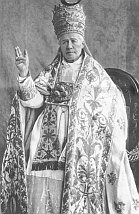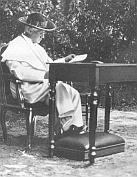Pope St. Pius X:
Modern Defender of the Catholic Faith
by Br. Ansgar Santogrossi, O.S.B.
One hundred years ago, on August 4, 1903, Cardinal Joseph Sarto of Venice was elected Pope Pius
X, the pope who would make St. Benedict's Monastery in Mount Angel, Oregon an abbey.
 Of peasant origin, the saintly and straight-speaking Pius X captured the world's attention while
proposing to "restore all things in Christ." Restoration was needed, for Freemason-influenced
governments, newspapers and public education in Catholic Europe were driving the Faith out of public life. Governments and social movements were spreading the myth of the ultimate supremacy of individual freedom. The clergy and educated Catholic laity were threatened from within by a crisis of faith which the Pope labeled "Modernism." Pius X would soon be called an obscurantist
for refusing to change the Catholic Faith. Claiming that modern science had discredited many dogmas, "Modernist" clergy proposed a new Christianity based on evolving "religious experience," a human experience which, they said, would continually transform the meaning of dogmas to
keep them authentic. Modernism, so contrary to common sense which knows that the true religion cannot contradict itself from one age to the next, was not always stated clearly, but the philosopher Jacques Maritain observed that young priests in Paris were advancing ideas about
"immanence," "creative evolution" and "vitality." Like an X-ray surgeon who brings out what is really going on beneath the surface, Pius X laid bare the false doctrines of the Modernists.
Of peasant origin, the saintly and straight-speaking Pius X captured the world's attention while
proposing to "restore all things in Christ." Restoration was needed, for Freemason-influenced
governments, newspapers and public education in Catholic Europe were driving the Faith out of public life. Governments and social movements were spreading the myth of the ultimate supremacy of individual freedom. The clergy and educated Catholic laity were threatened from within by a crisis of faith which the Pope labeled "Modernism." Pius X would soon be called an obscurantist
for refusing to change the Catholic Faith. Claiming that modern science had discredited many dogmas, "Modernist" clergy proposed a new Christianity based on evolving "religious experience," a human experience which, they said, would continually transform the meaning of dogmas to
keep them authentic. Modernism, so contrary to common sense which knows that the true religion cannot contradict itself from one age to the next, was not always stated clearly, but the philosopher Jacques Maritain observed that young priests in Paris were advancing ideas about
"immanence," "creative evolution" and "vitality." Like an X-ray surgeon who brings out what is really going on beneath the surface, Pius X laid bare the false doctrines of the Modernists.
As the Church's prayer says it on his feast-day, St. Pius X was a defender of the Catholic Faith. He knew it was not enough to simply write about the Modernist heresy, for heresy has a face, and sometimes the face of popular priests and writers known and loved by good people. Pius X directed that Modernist priests and professors who kept spreading their ideas had to be confronted, so as to convert them and to protect the Church from corruption of the Faith. No obscurantist, Pius X said dogma and Scripture could be rationally defended, and he promoted the philosophy of St. Thomas Aquinas and Scriptural studies. In dealing personally with some individual cases, the Pope moved slowly with pastoral concern, and he allowed at least one Scripture scholar the freedom to not accept certain decisions of the Roman Biblical Commission which were not matters of dogma. Before the canonization by Pius XII in 1954, an exhaustive study refuted accusations that Pius X had treated people unjustly.
The ideas about experience which Pius X strongly opposed dominated public education, politics and the mass media. Pius X called on Catholics to restore all things in Christ, to restore the Christian character of their governments, economy and education. With firmness tempered by compromise, he stood up to the hostile government of France, welcomed the support of French monarchists for the Church, and helped French bishops preserve their authority. After his death even political opponents in France recognized Pius X's greatness.
 Anti-modern-ist, Pius X was also modern in streamlining and restoring many areas of Christian life. Laws of the Church had piled up for centuries without much system;
Pius X initiated work for the Code of Canon Law of 1917 which still has its admirers today. So many saints were being celebrated liturgically that priests and people celebrated Sundays less and less and hardly ever prayed the weekday hymns of St. Ambrose; Pius X reformed the calendar to remedy this. Having heard his people sing Gregorian chant while a country priest and bishop, St. Pius X ordered popular but bad liturgical music to stop, declaring Gregorian chant and classical polyphony the sacred music of the Roman rite. "I want my people to pray on beauty." Children were growing up without Holy Communion until adolescence; Pius X fixed the age of reason as the time for first Communion.
Anti-modern-ist, Pius X was also modern in streamlining and restoring many areas of Christian life. Laws of the Church had piled up for centuries without much system;
Pius X initiated work for the Code of Canon Law of 1917 which still has its admirers today. So many saints were being celebrated liturgically that priests and people celebrated Sundays less and less and hardly ever prayed the weekday hymns of St. Ambrose; Pius X reformed the calendar to remedy this. Having heard his people sing Gregorian chant while a country priest and bishop, St. Pius X ordered popular but bad liturgical music to stop, declaring Gregorian chant and classical polyphony the sacred music of the Roman rite. "I want my people to pray on beauty." Children were growing up without Holy Communion until adolescence; Pius X fixed the age of reason as the time for first Communion.
This anti-modernist, modern saint on the throne of Peter has always had both critics and defenders. The novelist François Mauriac sniffed, "He's not a saint from my parish," while his contemporary George Bernanos' unforgettable literary portraits of a Modernist priest and of a bishop trying to keep up with the times showed what Pius X was concerned about. The monarchist poet and activist Charles Maurras of the Acadámie Française wrote Blessed Pius X Savior of France because of the Pope's defense of healthy philosophy and principles of society, while a French prime minister who fought the Church later acknowledged Pius X as "marvelous" and as having been turned to the future. In one of his most famous works, the apostate, avant-garde poet Guillaume Apollinaire could write, "Alone in Europe you are not old, 0 Christianity / The most modern European is you, Pope Pius X."
(Credit: Santogrossi, Br. Ansgar. "Pope St. Pius X (1903-1914), Modern Defender of the Catholic Faith." Mount Angel Letter Winter 2004: 4.)
Webmaster's Note: Pope Saint Pius X was a great confidant and supporter of Blessed Luigi Guanella and the first member of Bl. Luigi's Pious Union of Saint Joseph.
Provided Courtesy of:
LuigiGuanella.com
http://www.luigiguanella.com
 Of peasant origin, the saintly and straight-speaking Pius X captured the world's attention while
proposing to "restore all things in Christ." Restoration was needed, for Freemason-influenced
governments, newspapers and public education in Catholic Europe were driving the Faith out of public life. Governments and social movements were spreading the myth of the ultimate supremacy of individual freedom. The clergy and educated Catholic laity were threatened from within by a crisis of faith which the Pope labeled "Modernism." Pius X would soon be called an obscurantist
for refusing to change the Catholic Faith. Claiming that modern science had discredited many dogmas, "Modernist" clergy proposed a new Christianity based on evolving "religious experience," a human experience which, they said, would continually transform the meaning of dogmas to
keep them authentic. Modernism, so contrary to common sense which knows that the true religion cannot contradict itself from one age to the next, was not always stated clearly, but the philosopher Jacques Maritain observed that young priests in Paris were advancing ideas about
"immanence," "creative evolution" and "vitality." Like an X-ray surgeon who brings out what is really going on beneath the surface, Pius X laid bare the false doctrines of the Modernists.
Of peasant origin, the saintly and straight-speaking Pius X captured the world's attention while
proposing to "restore all things in Christ." Restoration was needed, for Freemason-influenced
governments, newspapers and public education in Catholic Europe were driving the Faith out of public life. Governments and social movements were spreading the myth of the ultimate supremacy of individual freedom. The clergy and educated Catholic laity were threatened from within by a crisis of faith which the Pope labeled "Modernism." Pius X would soon be called an obscurantist
for refusing to change the Catholic Faith. Claiming that modern science had discredited many dogmas, "Modernist" clergy proposed a new Christianity based on evolving "religious experience," a human experience which, they said, would continually transform the meaning of dogmas to
keep them authentic. Modernism, so contrary to common sense which knows that the true religion cannot contradict itself from one age to the next, was not always stated clearly, but the philosopher Jacques Maritain observed that young priests in Paris were advancing ideas about
"immanence," "creative evolution" and "vitality." Like an X-ray surgeon who brings out what is really going on beneath the surface, Pius X laid bare the false doctrines of the Modernists.
 Anti-modern-ist, Pius X was also modern in streamlining and restoring many areas of Christian life. Laws of the Church had piled up for centuries without much system;
Pius X initiated work for the Code of Canon Law of 1917 which still has its admirers today. So many saints were being celebrated liturgically that priests and people celebrated Sundays less and less and hardly ever prayed the weekday hymns of St. Ambrose; Pius X reformed the calendar to remedy this. Having heard his people sing Gregorian chant while a country priest and bishop, St. Pius X ordered popular but bad liturgical music to stop, declaring Gregorian chant and classical polyphony the sacred music of the Roman rite. "I want my people to pray on beauty." Children were growing up without Holy Communion until adolescence; Pius X fixed the age of reason as the time for first Communion.
Anti-modern-ist, Pius X was also modern in streamlining and restoring many areas of Christian life. Laws of the Church had piled up for centuries without much system;
Pius X initiated work for the Code of Canon Law of 1917 which still has its admirers today. So many saints were being celebrated liturgically that priests and people celebrated Sundays less and less and hardly ever prayed the weekday hymns of St. Ambrose; Pius X reformed the calendar to remedy this. Having heard his people sing Gregorian chant while a country priest and bishop, St. Pius X ordered popular but bad liturgical music to stop, declaring Gregorian chant and classical polyphony the sacred music of the Roman rite. "I want my people to pray on beauty." Children were growing up without Holy Communion until adolescence; Pius X fixed the age of reason as the time for first Communion.